

August 14 – 20: “If you could write in another genre, which one would that be?”
 If you could write in another genre, which one would that be? This week we’re joined by ITW Members J. L. Delozier, Charlie Flowers, J. D. Trafford, Maynard Sims, Bill Schweigart, Ritter Ames, Danny López, Barry Ozeroff and Carole Lawrence as they discuss what other genres they’d like to write in. Scroll down to the “comments” section to follow this riveting discussion!
If you could write in another genre, which one would that be? This week we’re joined by ITW Members J. L. Delozier, Charlie Flowers, J. D. Trafford, Maynard Sims, Bill Schweigart, Ritter Ames, Danny López, Barry Ozeroff and Carole Lawrence as they discuss what other genres they’d like to write in. Scroll down to the “comments” section to follow this riveting discussion!
~~~~~
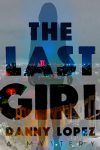 Danny López is a pen name. The author was raised in Mexico, Texas, and Florida. He worked numerous menial jobs before becoming a photojournalist, which allowed him to travel around the U.S., Mexico and the Caribbean and meet many of the characters that populate his stories. THE LAST GIRL is his first Dexter Vega novel.
Danny López is a pen name. The author was raised in Mexico, Texas, and Florida. He worked numerous menial jobs before becoming a photojournalist, which allowed him to travel around the U.S., Mexico and the Caribbean and meet many of the characters that populate his stories. THE LAST GIRL is his first Dexter Vega novel.
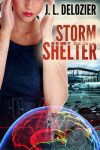 Dr. Jennifer Delozier submitted her first story, handwritten in pencil on lined school paper, to Isaac Asimov’s magazine while still in junior high school. Several years later, she took a creative writing elective at Penn State University and was hooked. She received her BS and MD degrees in six years, which was followed by the blur of internship, residency, and the launch of her medical career. But she never forgot her first love. Dr. Delozier spent the early part of her career as a rural family doctor and then later as a government physician, caring for America’s veterans. She continues to practice medicine and lives in Pennsylvania with her husband and four rescue cats.
Dr. Jennifer Delozier submitted her first story, handwritten in pencil on lined school paper, to Isaac Asimov’s magazine while still in junior high school. Several years later, she took a creative writing elective at Penn State University and was hooked. She received her BS and MD degrees in six years, which was followed by the blur of internship, residency, and the launch of her medical career. But she never forgot her first love. Dr. Delozier spent the early part of her career as a rural family doctor and then later as a government physician, caring for America’s veterans. She continues to practice medicine and lives in Pennsylvania with her husband and four rescue cats.
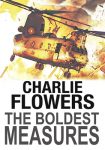 Charlie Flowers was born in Eastern Europe sometime in the late sixties and arrived with his family in Britain in 1975. After training as a journalist in London, he had a varied career as reporter, roadie, truck driver and record label boss. In the late nineties he formed two cult bands, and is currently an adviser on terrorism and extremism to certain departments and think tanks. Charlie Flowers is published by Endeavour Press, and is a member of the Crime Writers’ Association and International Thriller Writers.
Charlie Flowers was born in Eastern Europe sometime in the late sixties and arrived with his family in Britain in 1975. After training as a journalist in London, he had a varied career as reporter, roadie, truck driver and record label boss. In the late nineties he formed two cult bands, and is currently an adviser on terrorism and extremism to certain departments and think tanks. Charlie Flowers is published by Endeavour Press, and is a member of the Crime Writers’ Association and International Thriller Writers.
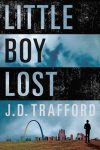 Award-winning author J.D. Trafford, described as “a writer of merit” by Mystery Scene magazine, has topped numerous Amazon bestseller lists, including reaching #1 on the Legal Thrillers list. IndieReader selected his debut novel, No Time to Run, as a bestselling pick. Trafford graduated with honors from a top-twenty law school, and he has worked as a civil and criminal prosecutor, as an associate at a large national law firm, and as a nonprofit attorney. He’s handled issues of housing, education, and poverty in communities of color. Prior to law school, he worked in Washington, DC, and lived in Saint Louis, Missouri. He now lives with his wife and children in the Midwest, and he bikes whenever possible.
Award-winning author J.D. Trafford, described as “a writer of merit” by Mystery Scene magazine, has topped numerous Amazon bestseller lists, including reaching #1 on the Legal Thrillers list. IndieReader selected his debut novel, No Time to Run, as a bestselling pick. Trafford graduated with honors from a top-twenty law school, and he has worked as a civil and criminal prosecutor, as an associate at a large national law firm, and as a nonprofit attorney. He’s handled issues of housing, education, and poverty in communities of color. Prior to law school, he worked in Washington, DC, and lived in Saint Louis, Missouri. He now lives with his wife and children in the Midwest, and he bikes whenever possible.
 Len Maynard & Mick Sims are the authors of seventeen novels with more scheduled, in the genres of supernatural horror, the Department 18 series, crime, mystery, thrillers and erotic romance. They have written award winning screenplays, numerous stories and novellas, essays, reviews and their tenth story collection has just been published. They occasionally work as editors, and previously as small press publishers. They have been friends for 50 years, live 25 miles apart, and when not writing they enjoy their families, gardening, reading and box sets.
Len Maynard & Mick Sims are the authors of seventeen novels with more scheduled, in the genres of supernatural horror, the Department 18 series, crime, mystery, thrillers and erotic romance. They have written award winning screenplays, numerous stories and novellas, essays, reviews and their tenth story collection has just been published. They occasionally work as editors, and previously as small press publishers. They have been friends for 50 years, live 25 miles apart, and when not writing they enjoy their families, gardening, reading and box sets.
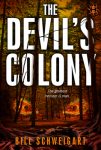 Bill Schweigart revives a bit of forgotten lore from the shadow of Washington, D.C. for his chilling thriller, The Beast of Barcroft, which finds a devilish creature stalking the residents of Arlington. Publishers Weekly says “Readers who appreciate a B-movie sensibility, affable characters, and a sense of fun along with their scares will find much to enjoy.” Its sequel, Nothwoods, follows Ben McKelvie and Lindsay Clark as they travel to the northwoods of Wisconsin to investigate sightings of a new and terrifying cryptozoological threat. THE DEVIL’S COLONY, the final novel in the trilogy, will be available July 11, 2017. Bill is a former Coast Guard officer who drew from his experiences at sea to write the taut nautical thriller, Slipping the Cable. Bill currently lives in Arlington, VA with his wife and daughter, who, along with their monstrous Newfoundland and mischievous kitten, provide him with all the adventure he can handle.
Bill Schweigart revives a bit of forgotten lore from the shadow of Washington, D.C. for his chilling thriller, The Beast of Barcroft, which finds a devilish creature stalking the residents of Arlington. Publishers Weekly says “Readers who appreciate a B-movie sensibility, affable characters, and a sense of fun along with their scares will find much to enjoy.” Its sequel, Nothwoods, follows Ben McKelvie and Lindsay Clark as they travel to the northwoods of Wisconsin to investigate sightings of a new and terrifying cryptozoological threat. THE DEVIL’S COLONY, the final novel in the trilogy, will be available July 11, 2017. Bill is a former Coast Guard officer who drew from his experiences at sea to write the taut nautical thriller, Slipping the Cable. Bill currently lives in Arlington, VA with his wife and daughter, who, along with their monstrous Newfoundland and mischievous kitten, provide him with all the adventure he can handle.
 Ritter Ames is the USA TODAY bestselling author of the Bodies of Art Mysteries and the Organized Mysteries series. She lives atop a scenic green hill with her husband and Labrador Retriever and spends each day globetrotting the art world from her laptop. Much like her Bodies of Art Mysteries, Ritter’s favorite vacations start in London and then spiral out in every direction. She’s been known to plan trips after researching new books and keeps a list of “can’t miss” foods to taste along the way.
Ritter Ames is the USA TODAY bestselling author of the Bodies of Art Mysteries and the Organized Mysteries series. She lives atop a scenic green hill with her husband and Labrador Retriever and spends each day globetrotting the art world from her laptop. Much like her Bodies of Art Mysteries, Ritter’s favorite vacations start in London and then spiral out in every direction. She’s been known to plan trips after researching new books and keeps a list of “can’t miss” foods to taste along the way.
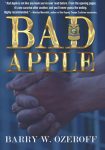 Barry W. Ozeroff retired in 2014 after a 28-year career as a police officer, both in La Mesa, CA and Gresham, OR. During his police career, Barry spent 4 years as a school resource officer, 6 years as a traffic motorcycle officer and member of the Vehicular Crimes Team, 5 years as a SWAT sniper, and 12 years as a hostage negotiator. Barry, who was also a field training officer and public information officer, is the recipient of numerous citizen and supervisor commendations, the Oregon Peace Officer’s Lifesaving Award, and the Gresham Police Department Medal of Valor. Bad Apple is Barry’s 4th novel, following Sniper Shot, Return Fire, and The Dying of Mortimer Post. The sequel to Bad Apple, Relative Justice, is under contract and will be released sometime in 2018. Barry has 5 children and 4 grandchildren, and lives with his wife in the Pacific Northwest.
Barry W. Ozeroff retired in 2014 after a 28-year career as a police officer, both in La Mesa, CA and Gresham, OR. During his police career, Barry spent 4 years as a school resource officer, 6 years as a traffic motorcycle officer and member of the Vehicular Crimes Team, 5 years as a SWAT sniper, and 12 years as a hostage negotiator. Barry, who was also a field training officer and public information officer, is the recipient of numerous citizen and supervisor commendations, the Oregon Peace Officer’s Lifesaving Award, and the Gresham Police Department Medal of Valor. Bad Apple is Barry’s 4th novel, following Sniper Shot, Return Fire, and The Dying of Mortimer Post. The sequel to Bad Apple, Relative Justice, is under contract and will be released sometime in 2018. Barry has 5 children and 4 grandchildren, and lives with his wife in the Pacific Northwest.
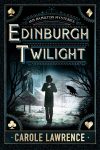 Carole Lawrence (Carole Buggé) is a New York-based suspense writer, performer, composer and prize-winning playwright and poet whose previous books have been praised as “lively. . .” (Publishers Weekly); “constantly absorbing. . .” (starred Kirkus Review); and “superbly crafted prose” (Boston Herald). Titan Press recently reissued her two Sherlock Holmes novels, The Star of India and The Haunting of Torre Abbey. Edinburgh Twilight, the first in her historical thriller series starring Detective Inspector Ian Hamilton, is now available for pre-order on Amazon.
Carole Lawrence (Carole Buggé) is a New York-based suspense writer, performer, composer and prize-winning playwright and poet whose previous books have been praised as “lively. . .” (Publishers Weekly); “constantly absorbing. . .” (starred Kirkus Review); and “superbly crafted prose” (Boston Herald). Titan Press recently reissued her two Sherlock Holmes novels, The Star of India and The Haunting of Torre Abbey. Edinburgh Twilight, the first in her historical thriller series starring Detective Inspector Ian Hamilton, is now available for pre-order on Amazon.
- The Big Thrill Recommends: RUN by Matthew Becker - October 14, 2024
- The Big Thrill Recommends THE LOST LIBRARY by Melissa Koslin - October 10, 2024
- The Big Thrill Recommends: NONE LEFT TO TELL by Noelle W. Ihli - October 10, 2024
